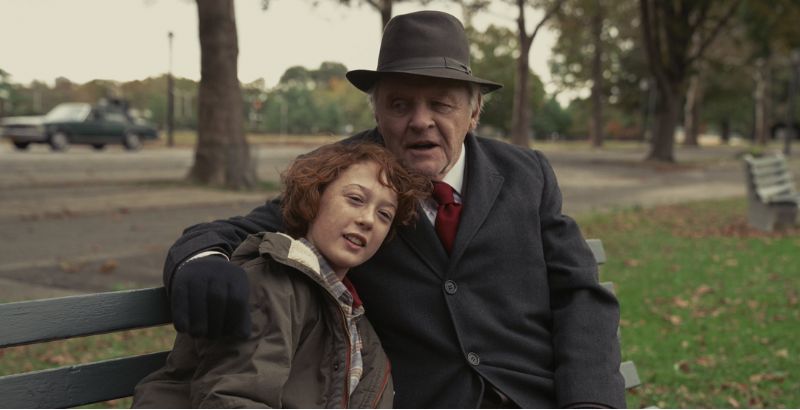
Spoiler Warning for Armageddon Time
From writer and director James Gray, Armageddon Time is a frustratingly shallow and ultimately malignant movie about privilege and the responsibility we have to lift others as we rise. The film itself is fine. I was entertained and thought every actor did an excellent job playing their parts. But I’m not sure that James Gray ever learned the real lessons of menschkeit he makes so central to the relationship between his main character Paul (Banks Repeta) and his grandfather Aaron (Anthony Hopkins).
More than anything else, to me, Armageddon Time is a film about the hopes of the Greatest Generation coming into stark tension with the expectations that Boomers place upon their own Gen X children. The grandparents and great aunts and uncles of Armageddon Time are fixated on the fight they made for upward mobility in a country that barely wanted them during a time when their home wanted them dead.
Meanwhile, Paul’s parents, Ruth and Irving played by Anne Hathaway and Jeremy Strong, have absconded from the fight of their parent’s generation to settle for a place of meager privilege and assimilation. They’ve changed the family name to not sound Jewish, they send their kids to private conservative schools despite being staunch liberals, and they speak ill of those in lower social strata, all in the hope that their own kids will make leaps and bounds beyond what they could have achieved.
You can hardly blame them. The horrors of the Holocaust were only a generation behind them, and Jews were not exactly afforded the kind of social opportunity other white folks were, let alone the ever-presence of antisemitism in modernity. But when Paul’s parents and their generation desisted from the active fight for a better life and settled into their social statuses, they also lost sight of the menschkeit that made their parents’ generation thrive.
Menschkeit, or being a mensch, is the colloquialization of a Yiddish word to mean “being a good and righteous person.” It’s a phrase that nearly any Jewish viewer of Armageddon Time will instantly recognize as a buzzword, calling Paul to righteousness when Aaron beseeches him to stand up for his Black friend Johnny (Jaylin Webb). Why, then, does Paul fail entirely to be a mensch when Johnny needs him to the most, and why does Armageddon Time seem perfectly okay with forgiving Paul for taking advantage of his meager privilege while Johnny goes to jail?
After all, Paul’s privilege at that moment is built entirely on his father’s own meschkeit; in the past, his father did work in the house owned by the very cop who chose not to charge him. Irving might describe his decision as simply having done so to “make a connection” as he alludes to being something he lacks compared to other families early on in the film. But in truth, it was an extension of the meschkeit that was surely instilled in him by his own parents from a young age.
In refusing to grapple with Paul’s failure to be a mensch in the most pivotal moment of his young life, Armageddon Time implies that meschkeit is an ideal and not a requirement, that it’s okay to slip up on your morals as long as you can still attest to them and strive to live them where you can. Is this a calculus that marginalized communities must make every single day? Absolutely. Is it a moral I find remotely satisfying in a movie that is seemingly meant to be about the virtues and obligation of menschkeit? Absolutely not.
Irving Graff is the bad guy in this movie. He yells a lot. He beats Paul. He makes dull speeches about staying small in a world too big to thrive in. He and his wife Esther generally give me enormous anxiety with the way their shrinking away from the big struggles of the world has made them emotionally cold and meager. Aaron is the good guy. He’s the only one who listens to and connects with Paul and clearly has a strong moral compass. So by literally killing off that light and trying to redeem Irving in the end, the film’s final moment completely bastardizes the essence of menschkeit.
In the end, the grand gesture of meschkeit Paul is able to muster is to simply leave the dance at his school filled with morally bankrupt people. He stands up for nobody—not himself, not his friends. He’s not acting like his grandpa’s vision of a mensch, he’s acting like his parents’. He desists rather than engages. Sometimes not being a part of the problem is merely the best one can do given the position of privilege Paul and his family lacks, as his mother especially drives home repeatedly to explain her lack of power within his school system as a mere PTA member. Especially as a young kid with conflicting influences and abysmal pedagogy at school, I can hardly blame him.
But I can blame James Gray. Gray is an adult who has had decades since his youth to grapple with these kinds of questions and to evolve his understanding of menschkeit beyond that of a child. No matter what struggles with the concept he may have had in his youth or that he expects youth to have, I feel fair in expecting that the movie at least would take a stand on what being a mensch ultimately means: always striving to righteousness, even when it’s difficult. But instead, we’re left with the cowardly stance that righteousness is only for the privileged. Realistic, perhaps, but upsetting nonetheless.
There are two famous lines from traditional Jewish text that often guide our principles as it pertains to menschkeit: “It is not your responsibility to complete the work [of seeking justice], but neither may you desist from it,” and “If I am not for myself, who will be for me? If I am only for me, what am I? If not now, when?” We are instructed as a people never to desist from the work of building a just society. We are meant to contemplate the consequences of what we become when we act only selfishly or choose to defer our actions until the time feels more convenient.
Armageddon Time, unfortunately, feels like an affront to the core, 2000-year-old tenets of menschkeit. A lack of privilege cannot excuse us from the essentiality of lifting all peoples as we rise. Juvanility or fear cannot excuse forgoing action now, even if we believe we can compensate later when we’re good and ready. Being a mensch means ever striving for righteousness. Not just when it’s convenient.
Armageddon Time is now playing in theaters.



